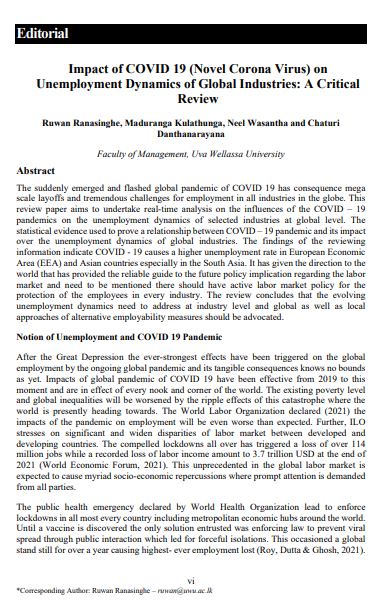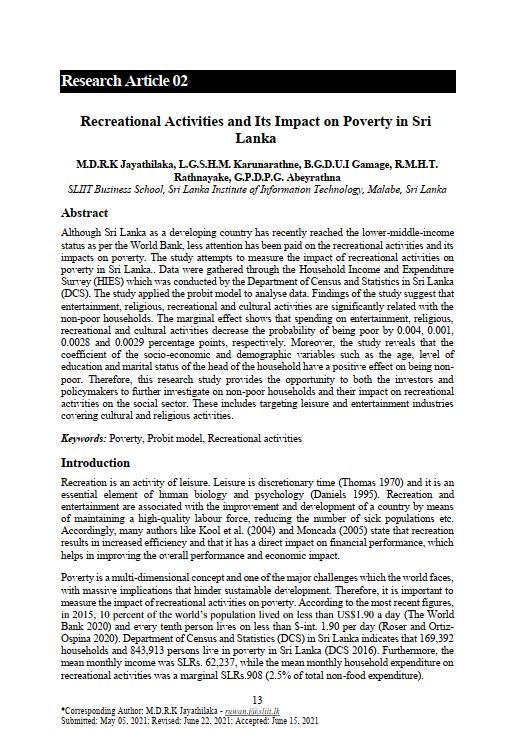Volume 05, Issue 02
TABLE OF CONTENTS
01. Financial Development and International Trade: Time Series Evidence from Sri Lankan Economy
K.H.I.S. Hettiarachchi and A.J.F. Shifaniya
INFORMATION
Journal Title: Journal of Management and Tourism Research
Volume : 5 Issue : 02
Page : 1- 13
K.H.I.S. Hettiarachchi1 and A.J.F. Shifaniya2
Department of Economics and Statistics, University of Peradeniya
ABSTRACT
This study examined the relationship between financial development and international trade in Sri Lanka using time series data from 1977 to 2019. The ARDL co-integration technique was used, and the study employed volume of exports of goods and services as the dependent variable, while five independent variables including two financial development indicators and three control variables. Our findings suggest that while domestic credit encourages exports in both the long and short run, financial development as measured by private credit does not. There exists, within the Sri Lankan context, a unidirectional impact on export coming from domestic credit however, no such causality can be detected from private credit. This highlights Sri Lanka’s need to manage its domestic credit and export impact to achieve external stability. Therefore, a wellestablished and effective financial market gives the economies involved more opportunities for international trade.
Key Words : ARDL, Financial Development, International Trade, Sri Lanka
02.Exploring the Social Innovation Literature: A Bibliometric Synthesis
Packiyanathan Mathushan1, Jasintha Nirojan2
INFORMATION
Journal Title: Journal of Management and Tourism Research
Volume : 5 Issue : 02
Page : 14- 29
Packiyanathan Mathushan1, Jasintha Nirojan2
1 Department of Public Administration, Uva Wellassa University of Sri Lanka
2 Department of Human Resource Management, University of Jaffna
ABSTRACT
Social innovation has become a salient catalyst for sustainability and inclusive growth. As a result of policy debates and collaborative responses to societal issues, social innovation has become critical for aiding communities where markets and established institutions fail. Nevertheless, academics and practitioners reap social innovation frequently; the conceptualisation has remained fragmented because no systematic effort has been made to grasp the fundamental idea behind social innovation. Ironically, the past literature claimed that research on the evolution of the social innovation domain is still in its infancy and requires further quantitative exploration. Arguably, traditional literature reviews significantly advance a specific research field; however, they lack a comprehensive evolution of the research domain. The present study uses bibliometric analysis to explore the social innovation domain (development and current trends). Bibliometric analysis is a widely used and rigorous approach for examining and interpreting vast amounts of scientific data. The database used was Scopus. The analysis found eight clusters: investing in social inclusiveness, emerging need, traditional business model, social entrepreneurship, empowering network constellation, human service organisation, categorisation scheme, social finance and contemporary societal challenge. In addition to this investigation, an analysis of the most frequently used terms was conducted to determine the most popular bibliographic information networks; this was attained using the VOSviewer visual bibliometric analyser. The paper contributes with new theoretical perspectives, in addition to contributing to practice.
Key Words : Bibliometric Analysis, Social Innovation, Sustainability, Quantitative Exploration
03. Import Substitution Industrialization and Economic Growth: Evidence from the South Asian Region
P.G.G. Lanka and P.P. Lalanie
INFORMATION
Journal Title: Journal of Management and Tourism Research
Volume : 5 Issue : 02
Page : 30- 41
Authors :P.G.G. Lanka1 and P.P. Lalanie2
Department of Business Economics, Faculty of Management Studies and Commerce,
University of Sri Jayewardenepura, Sri Lanka
1 https://orcid.org/0000-0002-4259-5765
2 https://orcid.org/0000-0002-9150-2326
ABSTRACT
The developing countries initiate various macroeconomic policies to achieve sustainable economic growth. Import Substitution Industrialisation (ISI) is one of the key policies adopted by developing countries, since World War II, to promote domestic production and reduce economic dependence on foreign countries. In this case, Import Substitution Industrialisation, as a trade policy has provided countries with different outcomes. Therefore, the empirical literature is inconclusive on the effectiveness of ISI policy for economic development. This study examines the impact of ISI on economic growth, with special reference to selected South Asian countries; Bangladesh, Bhutan, India, Nepal, Pakistan and Sri Lanka. This study employs panel data analysis, along with panel unit
root test, panel cointegration test, GMM dynamic panel data estimation, Granger causality test, and Impulse Response Function from 1990 to 2019. The findings of this study indicates that, manufacturing value added, total subsidies and inflation are statistically significant, while the trade balance and tariff on imports are insignificant to economic growth in South Asian countries. Moreover, impulse response reveals that, in the long run, the economic growth in the South Asian region has a slight response to ISI indicators. This paper concludes that ISI policy can significantly influence economic growth in the South Asian region in the short run but not in the long run. Therefore, it is recommended for South Asian countries adopt ISI policy in the short run to protect domestic industries, becoming more export-oriented in the long run
Keywords: Economic Growth, Dynamic Panel Data Analysis, Import Substitution
Industrialization, Macroeconomic Policy, South Asian Region
04. Competency Marketing in SME Sector: A Mixed Method Approach
Grace H. Hensman and Sathana Vaikunthavasan
INFORMATION
Journal Title: Journal of Management and Tourism Research
Volume : 5 Issue : 02
Page : 42- 58
Authors :Grace H. Hensman 1 and Sathana Vaikunthavasan2
Department of Marketing, Faculty of Management Studies & Commerce, University of Jaffna
1 https://orcid.org/0000-0002-4259-5765
2 https://orcid.org/0000-0002-9150-2326
ABSTRACT
The developing countries initiate various macroeconomic policies to achieve sustainable economic growth. Import Substitution Industrialisation (ISI) is one of the key policies adopted by developing countries, since World War II, to promote domestic production and reduce economic dependence on foreign countries. In this case, Import
Small and medium-sized enterprises (SMEs) are essential to most economies in emerging nations. The economy of Sri Lanka is mainly composed of small and mediumsized firms. Small and medium-sized enterprises face strong competition from both domestic and foreign companies. To survive in the cutthroat market, they must simultaneously innovate every system. SME’s must urgently build adequate and proper marketing competencies in order to meet the challenges. This study investigates the elements of competency marketing for Sri Lanka’s SME sector. For the purpose of this investigation, a mixed technique is used. The study’s target audience is the SMEs in Northern Province. Initially, utilizing snow ball sampling, 25 SMEs were chosen for this research project. In depth discussions were conducted with the interviewees. The competencies of SMEs were determined using thematic analysis. Using thematic analysis, nineteen factors were found, and they were divided into six dimensions : knowledge itself, accumulated knowledge, communication competency, judgmental competence, joint innovation competence, and absorption competence. The questionnaire was created using the quantitative approach to discover the dimensions of competency marketing. Out of 450 questionnaires, 436 were returned. The result of the study revealed four dimensions of loading structures of competence marketing, viz experiential knowledge, joint innovation competence, absorption competence and judgmental competence. When it comes to SMEs’ marketing competencies, experiential knowledge competence has a significant impact whereas judging knowledge competence has a low impact. SME owners need to consider accomplishments, capabilities, interactions, two-way communications, and qualifications. The focus of joint innovation competence should be on innovative products and production processes. Adopting a new technology would be better for all SMEs in this current technological era. The constantly shifting business environment will force the company to put more emphasis on judgmental capability
Keywords: Absorption Competence, Competency Marketing, Experiential Knowledge, Joint Innovation, Judgmental Competence, SME Sector
5. Factors Affecting the Effectiveness of Recognizing Prior Learning Model of Vocational Training in Sri Lanka – a Literature Review
N. A. R. P. Niwunhella 1 , R. Abeysekara 2 , S. Weligamage 2
INFORMATION
Journal Title : Journal of Management and Tourism Research
Volume : 5 Issue : 2
Page : 59 – 73
Correspondence : rniwun@gmail.com
1 Faculty of Graduate Studies, University of Kelaniya, Sri Lanka
2 Faculty of Commerce and Management Studies, University of Kelaniya, Sri Lanka
1 https://orcid.org/0009-0008-2739-7577
2 https://orcid.org/0000-0002-2858-6483
2 https://orcid.org/0000-0003-4028-0812
ABSTRACT
There is strong evidence for the collective nature of workplace learning model. Which is commonly known as the Recognition of Prior Learning (RPL) Model. In current context of Sri Lanka’s Vocational Training (VT). Data shows that as many as forty-four percent (44%) of school leavers in Sri Lanka join the job market as unskilled workers without proper training or an induction. This highlights the importance of VT in socio economic development of Sri Lanka (SL). Scholars argue that VT is practical & work based, in contrast to school and university education. The RPL model requires training and assessment processes that are fair, transparent, and consistent to ensure that the skills and knowledge of the individuals are recognized appropriately. RPL Model strategies can further be divided into two categories: (1) strategies that focus on completing certain work-related tasks and (2) strategies that focus more comprehensively on the learning process itself. The review suggests that there may be a need to improve the quality of the training and assessment processes in Sri Lanka to enhance the effectiveness of the RPL model. This review suggests that the effectiveness of the RPL model in SL is influenced by a complex set of factors. Addressing these factors requires a collaborative effort from various stakeholders. Researcher believes that further research is needed to better understand these factors and how they can be addressed to improve the effectiveness of the RPL model in Sri Lanka. The specific procedure used in this review was literature screening and review related to vocational training and workplace learning. The main review type for this study is a mapping review.
Keywords: Effectiveness, RPL Model, Vocational Training, Sri Lanka





